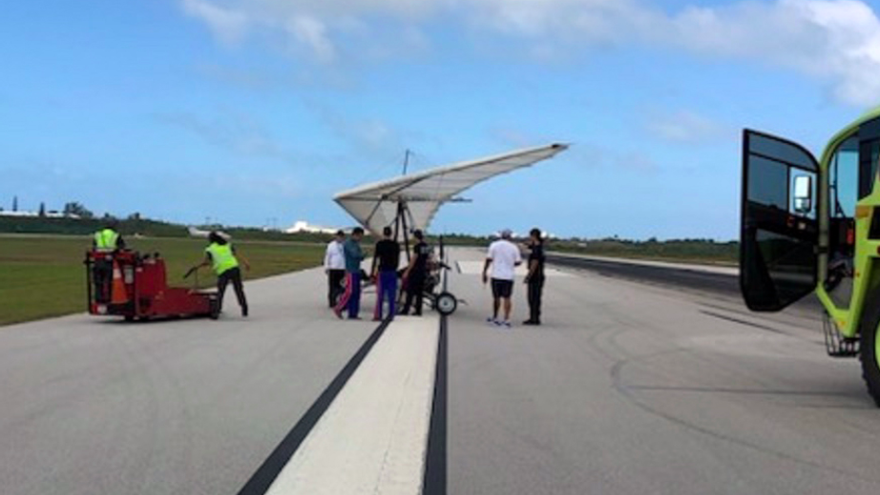
![]() 14ymedio, Havana, 6 July 6, 2023 — The United States granted political asylum to the two Cubans who landed at the Florida keys in a motored hang glider last March. David López Alfonso and Ismael Hernández Chirino will have to stay up to ten more days in the Krome migrant prison in Miami, waiting for the judge who granted them international protection to issue the order in writing.
14ymedio, Havana, 6 July 6, 2023 — The United States granted political asylum to the two Cubans who landed at the Florida keys in a motored hang glider last March. David López Alfonso and Ismael Hernández Chirino will have to stay up to ten more days in the Krome migrant prison in Miami, waiting for the judge who granted them international protection to issue the order in writing.
According to Univision journalist Daniel Benítez, the pilots “won their cases,” and although there is a possibility that the US Prosecutor’s Office will challenge the sentence, it is likely that it will not make any appeal.
This newspaper had access to several testimonies offered to the asylum court by legal experts, including those of lawyer Siro del Castillo, who presented a contextualization of the case of López and Hernández before the court. The director of the Cubalex legal aid NGO, Laritza Diversent, also collaborated with the defense team, led by lawyer Wilfredo Allen.
In his testimony, Del Castillo reminded the court that the Cuban government would have no mercy on both pilots and that the regime’s press had launched a campaign to demand their return. López and Hernández left Tarará, in the municipality of Habana del Este, in an ultralight delta wing, of the Trike type, with registration number CU-U 1619, which was used for the recreation of foreign tourists.
The Cuba Aviation Club — an entity, said the lawyer, led by former spy René González, “who at the time traveled to the United States with a plane that was stolen from Cuba” – argued that the action of the pilots was a “desertion,” and it asked for “the corresponding sanctions for the seriousness of the case and the return of the stolen equipment.”
Del Castillo stressed that both the Aviation Club and the Civil Institute of Aeronautics – which regulates Cuban airspace – are institutions that respond directly to the Government of the Island. To demonstrate this, he quotes González himself when he says that the Club “recognizes the political orientation of the Cuban State and its Constitution.”
There is, therefore, a relationship of “dependence” between the regime and the aeronautical institutions, according to the expert, which has led them to sign statements, for example, of support for the invasion of Russian President Vladimir Putin in Ukraine. This link, Del Castillo suggests, discredits the authority of the Aviation Club in terms of moral claims such as the one it intends in the case of López and Hernández.
Finally, and quoting the former spy again, Del Castillo argues the danger in which both pilots will find themselves if they return to a country where they are considered political “enemies”: “It is very difficult to make a revolution without having to guillotine someone. The important thing is that the guillotine is not the main instrument. Every revolution generates a counterrevolution and has to defend itself,” González said publicly in 2018, according to the lawyer.
Cuban pilots, Del Castillo concluded, will not have an opportunity for a fair defense in Cuba, where they have already been described as “traitors” by the highest authorities, and the Constitution of the Republic itself calls for “the most severe sanctions.” Both the fact that they stole a state air vehicle, and their relationship with the tourist sphere are, the lawyer considers, aggravating for their case and could lead to “major prison terms.”
Both pilots were part, during their Active Military Service, of the Cuban border guard corps, managing vehicles similar to the delta wing with which they escaped the country. “It is not surprising that the Cuban authorities, to give more weight to the accusation of ’traitors’ with a claim of a maximum penalty against López and Hernández, who are accused of having passed to the authorities of the United States, information about the air patrol system on the coasts of Cuba, would allow the government prosecutor’s office on the Island to accuse both of disclosure of secrets concerning the security of the State,” says the lawyer.
The judge was convinced, among other arguments, with the assertion that the action of López and Hernández “was motivated solely and exclusively by their desire to live in freedom,” as “hundreds of Cubans” have done in recent decades, “using boats and even planes owned by the Government.”
The latter was the case of Rubén Martínez Machado, a Cuban who managed to escape in a Russian-made Antonov plane on October 21 and land at the Dade-Collier Training and Transition Airport, located in the middle of the Everglades. The 29-year-old was a pilot of the Cuban Air Services Company, belonging to the Cuban Aviation Corporation, and he left the Island through Sancti Spíritus.
Customs agents interrogated the pilot as soon as he landed, and he was immediately put in the custody of the authorities. Martínez is currently free after a judge granted him political asylum.
Translated by Regina Anavy
____________
COLLABORATE WITH OUR WORK: The 14ymedio team is committed to practicing serious journalism that reflects Cuba’s reality in all its depth. Thank you for joining us on this long journey. We invite you to continue supporting us by becoming a member of 14ymedio now. Together we can continue transforming journalism in Cuba.
